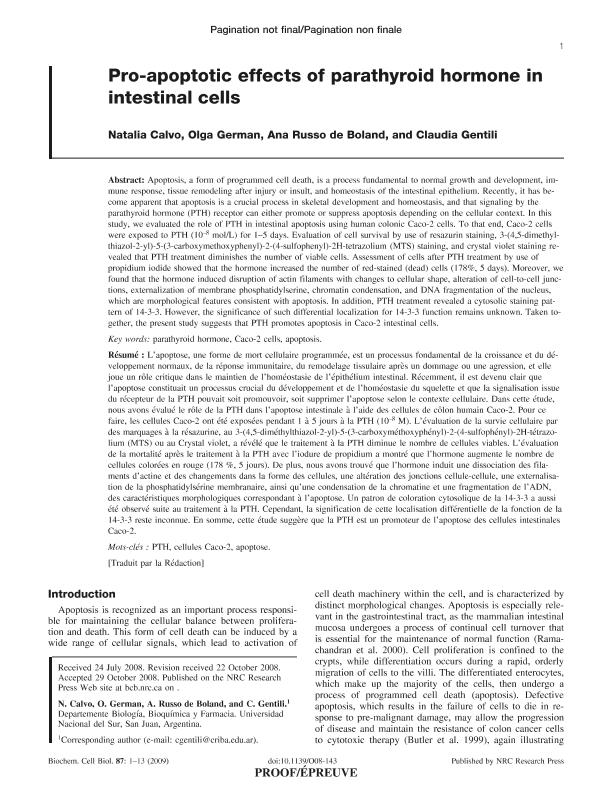Mostrar el registro sencillo del ítem
dc.contributor.author
Calvo, Natalia Graciela

dc.contributor.author
Russo, Ana Josefa

dc.contributor.author
Gentili, Claudia Rosana

dc.date.available
2018-04-23T16:08:01Z
dc.date.issued
2009-03-20
dc.identifier.citation
Calvo, Natalia Graciela; Russo, Ana Josefa; Gentili, Claudia Rosana; Pro-apoptotic effects of parathyroid hormone in intestinal cells; National Research Council Canada-NRC Research Press; Biochemistry and Cell Biology; 87; 2; 20-3-2009; 389-400
dc.identifier.issn
0829-8211
dc.identifier.uri
http://hdl.handle.net/11336/43022
dc.description.abstract
Apoptosis, a form of programmed cell death, is a process fundamental to normal growth and development, immune response, tissue remodeling after injury or insult, and homeostasis of the intestinal epithelium. Recently, it has become apparent that apoptosis is a crucial process in skeletal development and homeostasis, and that signaling by the parathyroid hormone (PTH) receptor can either promote or suppress apoptosis depending on the cellular context. In this study, we evaluate the role of PTH in the intestinal apoptosis using the human colonic Caco-2 cells. To that end, Caco-2 cells were exposed to PTH (10-8 mol/L) for 1-5 days. Evaluation of the cell survival by use of resazurin staining, 3-(4,5-dimethylthiazol-2-yl) -5-(3-carboxymethoxyphenyl) -2-(4-sulfophenyl)-2H-tetrazolium (MTS) staining, and crystal violet staining revealed that PTH treatment diminishes the number of viable cells. Assessment of cells after PTH treatment by used of propidium iodide shows that the hormone increases the number of red-stained (dead) cells (+ 178%, 5 days). Moreover, we found that the hormone induces disruption of actin filaments with changes to cellular shape, alteration of cell-to-cell junctions, externalization of membrane phosphatidylserine, chromatin condensation, and DNA fragmentation of the nucleus, which morphological features consistent with apoptosis. In addition, PTH treatment revealed a cytosolic staining pattern of 14-3-3. However, the significance of such differential localization for 14-3-3 function remains unknown. Taken together, the present study suggests that PTH promotes apoptosis in Caco-2 intestinal cells.
dc.format
application/pdf
dc.language.iso
eng
dc.publisher
National Research Council Canada-NRC Research Press

dc.rights
info:eu-repo/semantics/openAccess
dc.rights.uri
https://creativecommons.org/licenses/by-nc-sa/2.5/ar/
dc.subject
Apoptosis
dc.subject
Caco-2 Cells
dc.subject
Parathyroid Hormone
dc.subject.classification
Otras Ciencias Biológicas

dc.subject.classification
Ciencias Biológicas

dc.subject.classification
CIENCIAS NATURALES Y EXACTAS

dc.title
Pro-apoptotic effects of parathyroid hormone in intestinal cells
dc.type
info:eu-repo/semantics/article
dc.type
info:ar-repo/semantics/artículo
dc.type
info:eu-repo/semantics/publishedVersion
dc.date.updated
2018-04-05T18:20:54Z
dc.identifier.eissn
1208-6002
dc.journal.volume
87
dc.journal.number
2
dc.journal.pagination
389-400
dc.journal.pais
Canadá

dc.journal.ciudad
Otawa
dc.description.fil
Fil: Calvo, Natalia Graciela. Consejo Nacional de Investigaciones Científicas y Técnicas. Centro Científico Tecnológico Conicet - Bahía Blanca; Argentina. Universidad Nacional del Sur. Departamento de Biología, Bioquímica y Farmacia; Argentina
dc.description.fil
Fil: Russo, Ana Josefa. Consejo Nacional de Investigaciones Científicas y Técnicas. Centro Científico Tecnológico Conicet - Bahía Blanca; Argentina. Universidad Nacional del Sur. Departamento de Biología, Bioquímica y Farmacia; Argentina
dc.description.fil
Fil: Gentili, Claudia Rosana. Consejo Nacional de Investigaciones Científicas y Técnicas. Centro Científico Tecnológico Conicet - Bahía Blanca; Argentina. Universidad Nacional del Sur. Departamento de Biología, Bioquímica y Farmacia; Argentina
dc.journal.title
Biochemistry and Cell Biology

dc.relation.alternativeid
info:eu-repo/semantics/altIdentifier/url/http://www.nrcresearchpress.com/doi/abs/10.1139/O08-143#.WtTb4S7wbIU
dc.relation.alternativeid
info:eu-repo/semantics/altIdentifier/doi/http://dx.doi.org/10.1139/O08-143
Archivos asociados
